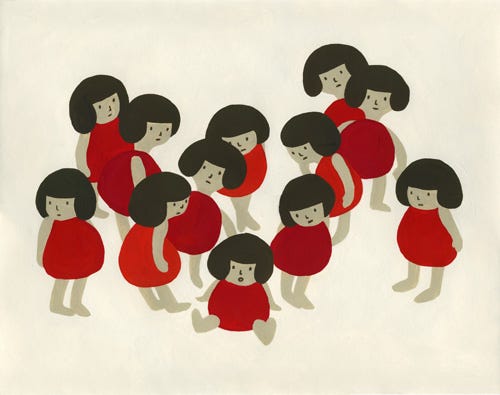✨Reminders✨
The Guerrilla Feminist is reader-supported! Thank you to the folks who pay monthly to support my work. If you want to be added to a paid plan, go here.
Wanna add to The Guerrilla Feminist Spotify Playlist? Go here.
Forward this email to a friend you think would enjoy it or take a screenshot and share it on social media and tag me!

Four women came forward in March 2017 to report that “actor” Danny Masterson raped them, and in late December of that same year, a fifth woman came forward. Society loves to point out the camaraderie of survivors as though it’s a bad thing; as somehow “proof” that what happened to them is make-believe; that they all conspired to create a false story. Women’s talk is very much a good thing, though. Women’s stories have power. That power scares society.
In May of this year, Masterson was convicted of raping two of the five women back in the early 2000s. Last week he was sentenced to 30 years to life in prison*. Character letters that his friends Mila Kunis and Ashton Kutcher (Coocher, as IG captions wrote) were released to the public last week.
I’m not here to delve into the conviction, the horrific abuse that Masterson inflicted, or even the Scientology angle of it. What I want to discuss is how women’s storytelling of our lived experiences is how we continue to keep each other safe.
Cultures throughout the world have depended on storytelling. In Italian cultures, women’s storytelling is integral to relating acts of activism and resistance. Jennifer Guglielmo writes, “Stories of women’s resistance were often a part of a storyteller’s repertoire, helping female rebels in particular to become folk heroines.” Storytelling in Indigenous communities is integral to maintaining and archiving their histories. In West African cultures, Griots are storytellers who protect and preserve a society’s history. Storytelling has been an important tool for marginalized communities for centuries. We find camaraderie by listening to others’ stories and telling our own.
The early use of blogs, message boards, and social media, has increased the rate at which we are able to tell our own stories in public and private digital spaces. It has allowed us control over our own narrative. It has also increased the potential that those in power will listen, or at the very least, see/hear us.
Using social media to tell our stories can get us national and international media attention. Chrissie Bixler, one of the survivors of Danny Masterson, has recently been sharing the truth of what happened to her and the other survivors on her Instagram stories. Many have questioned why she is doing this now. But these people don’t understand survivorship and they definitely don’t understand the stifling that happens with legal proceedings in place. Now that Danny Masterson has been sentenced, I would imagine that Chrissie feels like she can finally speak out—on her terms. Chrissie is telling us, the public, the story of what happened to her and how it has affected her life.
Women talk to each other, women warn each other—much of this has been referred to as “gossip” as a way to denigrate women’s words. Canadian philosopher Ronald de Sousa, notes “Gossip has been the object of much malicious talk. But then, so have all forms of power—and gossip is power” (Goodman & Ben-Ze-Ev). The history of gossip is quite interesting and I’ve written about it here.
The oppressor doesn’t want the oppressed to have even an ounce of power. Women’s talk is power. Women’s talk is lifesaving.
This is why the the prevalence of “Are We Dating The Same Guy?” groups on Facebook and other spaces is also important. In these groups, women post screenshots of men’s dating app profiles and ask whether any women in the group know anything about the guy in question. Specifically, women ask about red flags, the definition of which can differ from person to person, but for the sake of the group mostly refers to abusive behavior.
Women talk to each other, but men bank on women not doing so. This might be due to the fact that men see women as constantly competing with each other, especially for men (ha!), so why would they talk to each other about the same guy/s?
These private, locked-down information centers are the hidden, backlit rooms of storefronts. They are consciousness-raising groups where women protect women from men.
Is it sad that this is the world we live in? Sure. But until rape culture is dismantled, women and all marginalized folks will need our private (and public) online and offline spaces of storytelling for our own safety. We will continue to use social media to amplify our stories—including those about our survivorship and liberation.
We keep each other safe, after all.
[As a prison abolitionist, I am never "excited" about people going to prison. I also don't personally see it as "justice," but I know that many other survivors do see it as justice and I'm not about to tell them they're"wrong." What's hard is, rarely do we see rapists getting any amount of jail time so when one does, especially a white man who is a celebrity. So, this case is sort of a big deal. I am always envisioning alternative ways of justice and what an end to rape culture would actually look like, feel like, and how we might get there.]
🫀 Mood Board for the Week
Sea Sheep are my new faves:
With five old phones and some Pew data, the BBC’s Marianna Spring monitors social media from the inside - Sophie Culpepper
Drawing the inaccessible bus stops of Metro Transit - Rachel Litchman
Sex Worker Feminism - Chanelle Gallant
This TikTok trend has me dying. To read about it, go here.
This song that I had totally forgotten about:








Absolutely adore your thoughts on this and completely agree. Thank you for sharing ♥️♥️